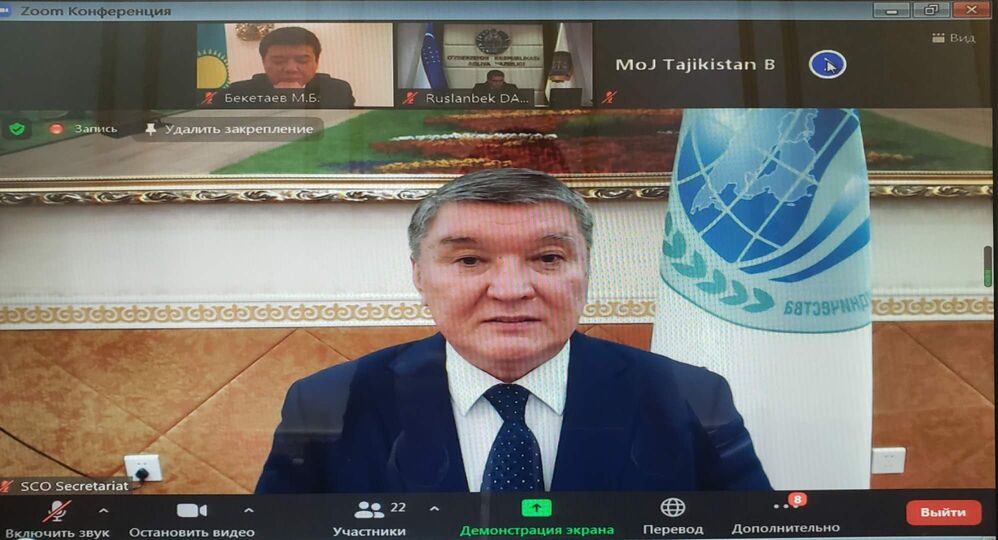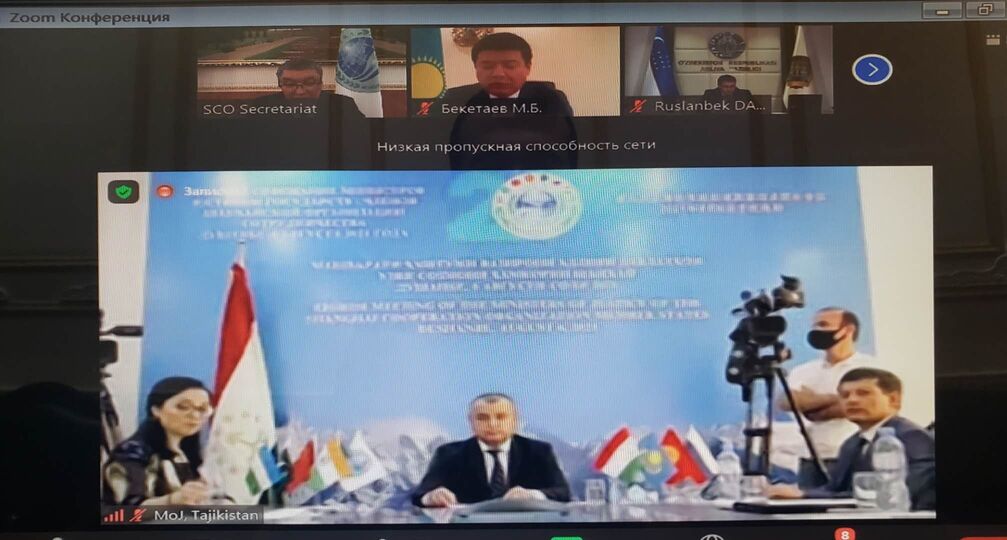The Eighth Meeting of the SCO Ministers of Justice took place on 6 August 2021, via videoconference, chaired by Tajikistan.
Taking part in the meeting were Minister of Law and Justice of the Republic of India Shri Kiren Rijiju, Minister of Justice of the Republic of Kazakhstan Marat Beketayev, Minister of Justice of the People's Republic of China Tang Yijun, Minister of Justice of the Kyrgyz Republic Asel Chynbaeva, Minister of Law and Justice of the Islamic Republic of Pakistan Farogh Naseem, Minister of Justice of the Russian Federation Konstantin Chuychenko, Minister of Justice of the Republic of Tajikistan Muzaffar Ashuriyon, and Minister of Justice of the Republic of Uzbekistan Ruslanbek Davletov.
Minister of Justice of the Republic of Tajikistan Muzaffar Ashuriyon chaired the meeting.
During the event, the ministers discussed the current state and prospects of collaboration among the SCO member states on matters such as pandemic-era justice and law, the operation of frameworks for providing free legal services to individuals, and the role ministries of justice and law play in combating corruption and improving the international treaty framework within the SCO. The participants agreed to further strengthen their cooperation through regular dialogue, as well as by holding conferences and seminars, and organising mutual visits to share best practices.
Those taking part gave a positive assessment of teamwork among their respective justice ministries over the past years, citing expert groups on forensic practices and legal services within the Meeting of the SCO Justice Ministers as effective cooperation mechanisms. They also praised the efforts made by these working groups to implement their activities' plans.
SCO Deputy Secretary-General Yerik Ashimov addressed the meeting and read out a message of greetings on behalf of SCO Secretary-General Vladimir Norov.

In his written remarks, Vladimir Norov emphasised that, guided by the Shanghai Spirit, the member states' justice ministries have accumulated a whole wealth of positive cooperation experience over the 20 years since the establishment of the SCO in drafting laws and regulations, providing legal services and assistance for protecting the rights and freedoms of their citizens, as well as promoting deeper legal reforms in the SCO countries. The global COVID-19 pandemic has made it harder for justice agencies and their subordinate organisations around the world, including in the SCO countries, to fulfil their duties.
This has highlighted the urgent need to accelerate the digital transformation and the need to implement cutting-edge ICT solutions and online services.
"In accordance with the SCO Development Strategy Towards 2025, fighting corruption is one of the primary tasks for the organisation in its efforts to ensure regional security and stability," Mr Norov pointed out in his address.
To this effect, the SCO member states are expected to embark on a comprehensive effort in keeping with the SCO Agreement on Combating Crime, signed in Tashkent in 2010, including by sharing best practices and information, as well as taking practical steps to facilitate cooperation among the competent agencies.
Mr Norov noted that justice ministries play an important role in drafting laws and regulations for preventing corruption-related crime by performing corruption risk assessments with regard to laws and regulations, including in draft versions, designed to prevent corruption.
In conclusion, he proposed reviewing and adopting a Comprehensive Plan of Activities for the SCO Justice Ministries for implementing the Agreement on Combating Crime in 2022-2024. This plan should provide for cooperation and sharing best practices in ensuring the respect for and the protection of human rights and freedoms, providing free legal assistance, improving legal literacy, countering corruption within the SCO, etc.
In this context, the SCO Secretary-General said that the Secretariat was ready to provide all the necessary assistance in preparing and adopting the plan with the view to further strengthening cooperation among the SCO justice ministries.
In their remarks, the justice ministers discussed the ongoing efforts and achievements during the pandemic. The speakers stressed that no single country can defeat the virus on its own, meaning that everyone should join efforts to overcome the consequences of the pandemic by improving legal frameworks, as well as updating programmes and strategies in view of the recent developments.
Speaking on the topic of free legal assistance to individuals, the heads of the delegations underlined that initiatives to improve services of this kind should be backed by research and take into consideration the needs of the population.
Those at the meeting noted that corruption poses a serious threat to the human society and said that they shared the concern of the international community about this matter. In this context, they said that the SCO member countries should exchange best practices on their efforts to combat corruption.
The participants supported unanimously the proposal made by Pakistan to hold the next Meeting of the SCO Justice Ministers in the Islamic Republic of Pakistan in 2022.
They adopted a Joint Statement of the SCO Justice Ministers to sum up the meeting's results.
